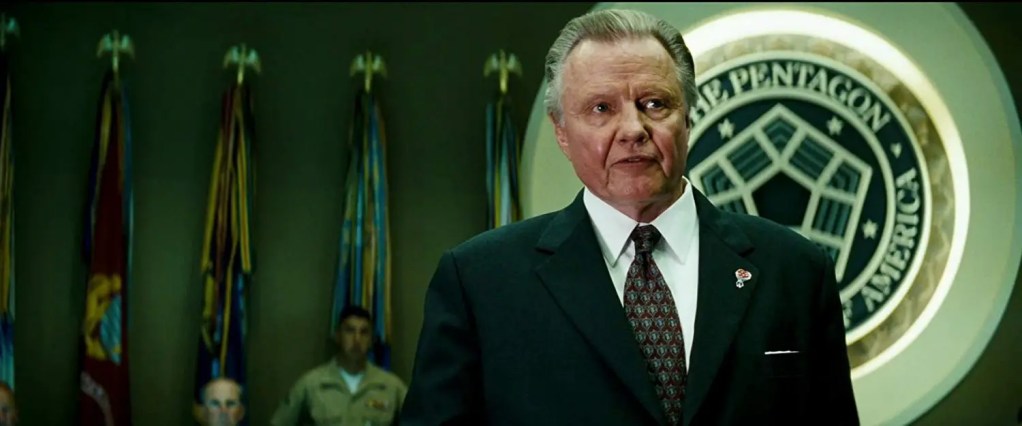[Published at Living Life Fearless] The more invasive form of censorship in film, the kind that isn’t meant to be disclosed to the public, the kind that deals with critiques of U.S. politics and government institutions (military, branches of government, etc.), is most threatening to the way American citizens view their democracy. As there are far too many censored films to analyze, the third and final article in the censorship series will look at specific examples of films that have worked with the C.I.A., F.B.I., and Pentagon to ensure, whether unintentionally or intentionally, that the aforementioned crumbling paradigm of maintaining the benevolent American image is preserved.
Take with you our invaluable resources, our fruitful advice, our sacred blessings, and blindly cherish your tainted vision, your fetid values, your precious ‘freedoms.’
– Yours Truly
Granted to them by the Pentagon under the Freedom of Information Act, journalists Tom Secker and Matthew Alford obtained 4,000 documents that proved both the Pentagon and the C.I.A. have had a creative hand in over 800 feature films and 1,000 television shows.
On top of script meddling, the Pentagon specializes in script rewrites, even on a few of the most prominent franchises such as James Bond, Transformers, and Marvel Cinematic Universe (MCU) and DC Extended Universe (DCEU) films. These films tend to engage the U.S. military in their scripts, and thus, the Pentagon sees it as its rightful duty to intervene. They also have complete control over their diverse military-funded TV portfolio, examples of which include Hawaii Five-O, America’s Got Talent, Oprah, Jay Leno, Cupcake Wars, and several PBS, History Channel, and BBC documentaries. So, there are films influenced by and funded by the military, but, alas, the Pentagon ensures there aren’t disrespectful critiques. Statements that could make the U.S. look weak.
Unfortunately, if one wants to use military assets to help make the production value of their film authentic, they have to submit their script to the Pentagon. Until last year, when he retired, that script found its way to former Navy cameraman, Vietnam veteran, and film school graduate Philip Strub, the Department of Defense’s (DOD) chief Hollywood liaison. He essentially made sure that Hollywood didn’t trash the military industrial complex for 30 years, spanning Bush Sr., Clinton, W. Bush, Obama, and Trump’s presidencies.
The Reign of Strub
Strub even has some screenwriting contributions to his name. In the book National Security Cinema, it is revealed that Strub wrote a line for a scene in Michael Bay’s Transformers, as previously referenced, during which American forces come under danger from the Decepticons. Jon Voight (get well soon), the Secretary of Defense in the film, was improvising lines, when Strub suggested, “Bring ’em home” and “murmurs of agreement moved through the circle,” the latter of which made it to the final cut.

PARAMOUNT PICTURES
According to Strub, who considers Oliver Stone a “leftist” filmmaker (liberal, yes; leftist, no), the DoD doesn’t have a blacklist. Rather, it simply boils down to a script by script basis. Ironically, Strub told The Outline in an interview that he condones propaganda as, “something that is put together deliberately to mislead, to brainwash people, to twist the real… And maybe you’d accuse me of being too pro-military but to me, the movies we work with, they’re morale-improvement… We’re not trying to brainwash people! We’re out to present the clearest, truest view.”
That statement is either one of the most insidious, blatant lies, predicated on the belief that our country is vastly naïve – considering the extent and lengths to which the federal government has gone (and will go to) in order to preserve the image of their pillar institutions – or it is a sobering representation of Strub’s own willful naiveté.
He essentially made sure that Hollywood didn’t trash the military industrial complex for 30 years…
“The reason we get involved at all is because it’s an opportunity to tell the American public something about the military that they may not know or to be a benefit to military recruitment or retention,” Stub continued. In exchange for an overwhelmingly positive portrayal of the military (sugar-coating, false portrayal of historical current events, etc), films obtain access to military equipment. Furthermore, Strub sees these “favorable” portrayals as fundamental opportunities to increase nationwide military recruitment and retention, infiltrating our theaters and televisions at home. He’s right. That isn’t propaganda. That’s subliminal propaganda. Strub: The mastermind behind brainwashing the public. Strub: The democracy-threatening hypocrite; a symptom of an infested organization.
Strub quietly retired in 2018, and was succeeded by the still-relatively unknown David Evans. One can logically assume that Evans will continue to carry out the DoD’s screenwriting endeavors in Hollywood.
Iron Man
Recent films Strub had been involved in before his retirement were Pitch Perfect 3, 12 Strong, The 15:17, and Iron Man. As many hopefully realize, W. Bush’s “War on Terror” has proven to be almost as ineffective as Reagan’s “War on Drugs.” Having directed Iron Man, Jon Favreau is largely credited as one of the founding fathers of the MCU. In Iron Man, CEO of Stark Industry and chief weapons manufacturer for the U.S. military, Tony Stark (Robert Downey Jr.) funded and perpetuated the military industrial complex, initially, before being kidnapped in Afghanistan by the Ten Rings terrorist organization, led by Raza (Faran Tahir), armed with Stark weaponry. After this near-death experience, Tony breaks up with the U.S. military and vows to become a peacemaker instead of a warmonger. One can see why the Pentagon was all over this.

PARAMOUNT PICTURES
As the story goes, one day during filming on Edwards Air Force base, Strub and Favreau got into a war of words over the script. Much to Strub’s dismay, Favreau wanted to leave the line, “People would kill themselves for the opportunities I have,” recited by a person in the armed forces, in the film. Ultimately, the line was omitted from the film. There is a harsh reality to provide context to this seemingly banal encounter. There have been periods throughout the “War on Terror” during which, more U.S. soldiers have died by suicide than they have by enemy combat. So, then, suicide remains a sensitive subject matter in the eyes of the government, not for the sake of human kindness, but for the sake of the preservation of the aforementioned crumbling American image. What is more self-centered and material than that? Rather, what’s more American than that? We don’t care about the cause, only how it makes us appear to the outside world.
Zero Dark Thirty
It isn’t always Strub pushing pencils, reading Hollywood’s scripts in Virginia. The C.I.A. has done its fair share of script infiltrating. When Kathryn Bigelow’s “Mark Boal-penned“ Zero Dark Thirty, about the capture and assassination of Osama bin laden, hit theaters, its controversial depiction of government torture, C.I.A. involvement in the al-Qaeda terrorist leader’s downfall, and factual discrepancies raised the eyebrows of certain audiences. Indeed, the C.I.A. was heavily involved throughout production.
Mark Boal worked closely with certain C.I.A. agents, vetting Zero Dark Thirty‘s script for authenticity, instead being told to change certain moments or aspects within the story, such as removing a scene during which a C.I.A. agent drunkenly fires his AK-47 into the air, or making Jessica Chastain’s character, Maya, less involved in the torture scenes. These weren’t men in suits secretly passing on coveted information to Boal, this was Leon Panetta, the Director of the C.I.A. under President Obama from 2009 to 2011, and his agents, personally offering to assist Boal throughout production and provide him with classified information regarding the bin Laden raid in exchange for toning down the C.I.A. critiques. Furthermore, access to Zero Dark Thirty’s narrative allowed the C.I.A. to preempt an entirely crucial, fact-based investigation into their actions by the United States Senate (led by Senate investigator Daniel Jones), condemning their actions of torture as not only ineffective, but in direct violation of the Geneva Convention. Even further, the C.I.A. knew that the Senate’s report would be able to prove that torture had nothing to do with the capturing of bin Laden. As such, the criminal organization had to look deeper. They saw an opportunity to launch a PR campaign in the most ideologically influential medium in the history of humankind.
…the Director of the C.I.A… personally offering to assist Boal throughout production and provide him with classified information regarding the bin Laden raid in exchange for toning down the C.I.A. critiques.
What ensued prior to Zero Dark Thirty‘s production, when the project was still in its nascent stage, was what can best be explained as a courting process with the C.I.A. on Boal and Bigelow’s behalf. A series of increasingly surreptitious and lavish wooing. Essentially, Boal and Bigelow bribed C.I.A. officers through a series of exorbitant meals, drinks, hotels, and off-the-books gifts – emblematic of “the Hollywood lifestyle experience” – that went unreported by said officers. There was a group of at least 10 C.I.A. National Clandestine Service (NCS) officers involved in the hunt for bin Laden who essentially served as the intelligence brain trust for all things related to the bin Laden raid for Boal and Bigelow’s “factual” clarification during production, all of who were consistently treated to meals totaling over $1,000, which prompted an internal ethics investigation. Working with the filmmakers became a popularity contest within the C.I.A.’s Office of Public Affairs (the liaison between the C.I.A. and Hollywood), each officer vying for the Hollywood players’ affection.

COLUMBIA PICTURES
“There would be no eulogies for…” Maya, figuratively. As far as the public knew, she never existed. The unsung hero. Although an amalgamation of multiple people, Maya represents the public image of modest, reticent heroism that the C.I.A. so thoroughly attempts to ingrain in the American people. Although, there isn’t much humility in a government organization, tasked with dauntingly important national security matters, seemingly more preoccupied with preserving their false benevolent public persona. Perhaps they should come to terms with the fact that the “few bad apples” trope in film hurts government organizations more than anything. The commentary that the grueling torture scenes sparked effectively distracted the industry from the blatant covering of their tracks that the C.I.A. did before our very eyes. We may never know exactly how the C.I.A. were involved in bin Laden’s death, But we do know that torture was not only not linked to bin Laden’s downfall, but it has been proven by the C.I.A., through internal investigations, as ineffective, several times since the 1960s. The film remains one of the most blatant examples of modern government censorship.
Senior United States Senator of California Diane Feinstein, one of the key people behind the aforementioned, classified report on U.S. torture, wrote to Sony Pictures demanding that they acknowledge the film’s inaccuracies, specifically its “suggestion that torture resulted in information that led to the location of Osama bin Laden.” She continued, “the use of torture should be banished from serious public discourse for these reasons alone, but more importantly, because it is a violation of the Geneva Conventions, because it is an affront to America’s national honor, and because it is wrong… We cannot afford to go back to these dark times…” Indeed, the film, though supposedly politically neutral, is widely regarded by critics as right-wing propaganda. Congratulations, former Director Panetta, you wrote a revisionist history film more damaging to the U.S.’s image than any form of critique about any one of its institutions that the government has continuously tried to suppress throughout history.
Other C.I.A. Examples
Other notable films the C.I.A. has been involved in over the years since their inception in 1947 (they’ve consulted in 60 films and television productions) include The Recruit, Meet the Parents, Hulk, Contact, and a successfully scrapped Marlon Brando picture about the Iran-Contra scandal depicting the U.S. illegally selling weapons to Iran under former President Reagan and consequently being responsible for some of the worst human rights violations of the 20th century, committed against the socialist Sandinista government and its innocent supporters in Nicaragua during the 1980s.
This is entirely in line with the U.S.’s policy towards creative expression (which they view as a threat to both the status quo and their waning public image, domestically and abroad) and any persons or entities that attempt to produce an honest artistic rendering of a shameful period in our history that isn’t a staple in our children’s history books in schools. The curbing of Brando’s Iran-Contra film is a prime example of the U.S. using intimidation to cover up an example of it exercising its domination by not only feeding its economic power through the extraction of valuable raw materials, but suppressing any movement that would challenge the aforementioned unipolarity established in a post-Cold War order.

UNIVERSAL PICTURES
Most of these changes requested at the behest of our “oh-so-honest” government institutions seem benign. During the production of Hulk, the DoD requested odd script changes, according to information obtained from the Freedom of Information Act, including removing all ties to the military lab that created the “monster” and changing the codename of the operation to capture the Hulk in the third act of the film from “Ranch Hand,” an actual chemical warfare program during the Vietnam war, to “Angry Man.” Another strange example can be found in the archives from the making of Contact. According to records, the Pentagon demanded a scene in the original script where the military expresses concern over an alien invasion, to which Jodie Foster’s character rebukes as “paranoia right out of the Cold War,” be removed. It’s quite fascinating that the U.S. government refused to even be associated with the idea of being open to making, for lack of a better word, contact with an alien species. Ahem. Area 51. Ahem (I’m only being half facetious, of course).
Again, television is no different, as one would expect after making it this far into this article. More than 2,000 television series, including the previously mentioned 24, Homeland, NCIS, Hawaii Five-O, America’s Got Talent, Oprah, Jay Leno, Cupcake Wars, documentaries by the PBS, the History Channel, and even the BBC, and much of the content you love to binge every week, have all been influenced by the CIA and the Pentagon. They employ the same tactics and vetting processes as they do with films.
The Facade of Freedom of Speech
We’ve come a long way since the turn of the 20th century when evangelism suppressed the new art form that was cinema through local state laws, then the MPAA, the CIA, the FBI, and the DoD. Our government now has a near monopoly over the content that they ultimately wish (and don’t wish) us to view about their institutions. So much for antitrust laws. A vast expansion of the aforementioned first censorship law passed in Chicago in 1907 and the evangelical values of the National Board of Review of Motion Pictures established in 1909, the federal government’s censorship endeavors now seek to maintain the false image of a conservative America with decent Christian values such as “Thou shalt love thy neighbor as thyself,” while our institutions simultaneously violate that principle along with a multitude of others. Namely, “Thou shalt not kill,” “Thou shalt not steal,” “Thou shalt not bear false witness against thy neighbor,” (they’ve grown so accustomed to lying to their citizens, it’s become difficult to sift through the bullshit in order find the objective truth), and “Thou shalt not covet…anything that is thy neighbor’s.” Consider the “neighbor” in these commandments other countries that the U.S. engages with.
This confounding hypocrisy is the exact blemish on its image that the U.S. government tries so diligently to cover up by keeping the entertainment industry within its seemingly boundless reach and suffocating grasp. This is either troubling or indifferent, depending on whether or not the truth matters to you. Whether or not you are willing to amble through life content, oblivious to the fact that we live in a country that is closer to the authoritarian governments that we clash against than most of the population would be comfortable with. That our government essentially has and continues to subliminally brainwash us through the most beloved and influential art form of the 20th and 21st centuries.
…the federal government’s censorship endeavors now seek to maintain the false image of a conservative America with decent Christian values…
How can artists unflinchingly express themselves? How can art, inherently intertwined with political expression, be suppressed by our own government, for so long? The allure of money and power trumps everything in a materialistic society. That, and, not wanting to get in on the bad side of sketchy organizations such as the F.B.I. and the C.I.A. Probably, mostly, that. Regardless of why or how our government manages to slide its slimy appendages into the goodwill of many-a-complicit filmmakers who are happy to promote the aforementioned agenda to preserve the idea that the U.S. is that selfless, philanthropic, and magnanimous country they’ve worked so hard to build an image around.
Perhaps, one day, we will get a film daring enough to depict things as they are. That our shitty foreign policies are not the result of a few bad apples operating within an otherwise benign or often benevolent organization, but an institutionalized, well-established order. A calculated status quo. Until then, it’s up to journalists to continue to hold the U.S. accountable for the atrocities it has committed and continues to commit on a daily basis, what it actively does to ensure that the public doesn’t interpret such events as they actually unfolded, and how engaging in censorship tactics in film, television, and other forms of media is an integral part of this public suppression.
REFERENCES:
https://ncac.org/resource/a-brief-history-of-film-censorship
https://www.businessinsider.com/cia-helped-produce-zero-dark-thirty
https://gawker.com/declassified-memo-shows-how-cia-shaped-zero-dark-thirty-493174407
https://theoutline.com/post/3794/hollywood-propaganda-12-strong-phil-strub?zd=1&zi=wymanfdl
https://newspunch.com/lawsuit-cia-hollywood/








Leave a Reply
Your email is safe with us.